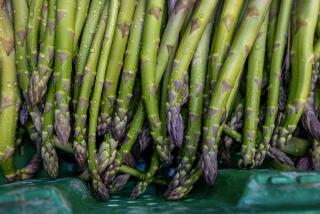Seek ‘Perfect’ Escargot : U.S. Farmers Go After French Snail Market
- Share via
FRESNO — Francis Herb and Elton Geist are trying to breed a new, improved California “Super Snail.”
Their creation would be resistant to a host of parasitic mollusk diseases, would grow to maturity in just five months, weigh 8 grams and possess the ideal physique--1 inches long, 1 inch wide and 7/8 of an inch tall.
And of course, its sublime taste would hopefully surpass that of the $300 million in snail meat, better known as escargot, which are now imported mostly in cans almost exclusively from Taiwan and France.
“We have set a standard now for the perfect snail. It’s the juiciest, the most succulent, the tastiest, and we can sell it for $1 each,” boasts Ralph Tucker, 69, president of the Fresno-based Snail Club of America.
But only about 5% of the snails now being raised meet those specifications.
Working in makeshift home laboratories 150 miles apart, Herb, 78, of St. Helena, and Geist, 60, of Colfax, are engaged in elaborate natural selection experiments, hoping to find the offspring that will pare mass production costs.
Their experiments symbolize the dawning of a new age for America’s budding escargot industry.
“This is a revolution in the American food industry,” said Tucker. “People are revolting against the imports.”
It is a business that just four years ago consisted largely of a handful of retirees supplementing their income.
But now American snail farmers range from young urbanites to elderly ranchers, and together they are bringing the industry to unparalleled heights. The nation’s first snail cannery, the Enfant Riant California Escargot Inc., opened in Petaluma last year and supplies 300 restaurants, gourmet shops and department stores.
Geist sells prepackaged, nutritionally balanced snail food by mail order, and a plethora of patented inventions for snail farmers also are sold by other entrepreneurs.
The first international snail growers convention is scheduled next year in Memphis, Tenn. Afterward, exports of American snails are expected to begin.
Other growers are conducting extensive private research on diet, disease, genetic engineering, mortality rate reduction and artificial habitat.
Tucker plans to incorporate the Snail Club of America to act as a commodity broker throughout the United States.
“There’s a great potential for this,” Jim Taylor, who farms outside Memphis, at the recent annual snail growers’ convention in Fresno. “This is an all-American business and we’re just beginning to scratch the surface.”
Legend has it that California’s ordinary brown snail, for decades the bane of gardeners and farmers, was brought to the West Coast by French gold miners in the 1850s. Tucker contends that they are at least equal in taste to the escargot sold in most restaurants, which sometimes are only slices of fist-sized snails from Taiwan.
John Knowland of Bakersfield believes that the relatively tiny domestic escargot industry is at the same level of development as California’s wine industry was 20 years ago when European wines dominated the market.
More to Read
Sign up for Essential California
The most important California stories and recommendations in your inbox every morning.
You may occasionally receive promotional content from the Los Angeles Times.












